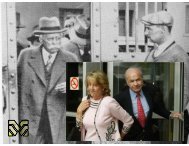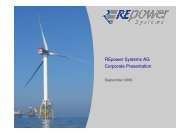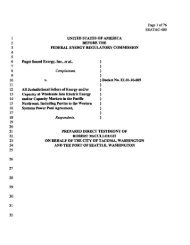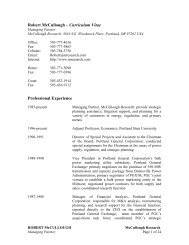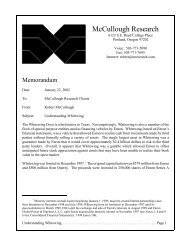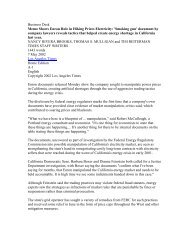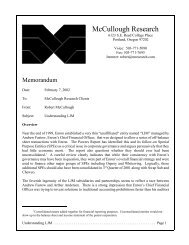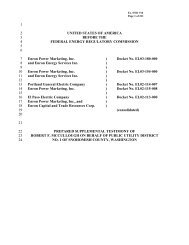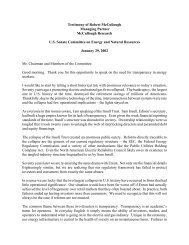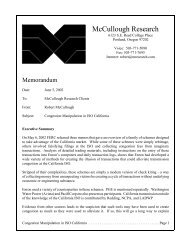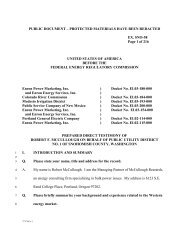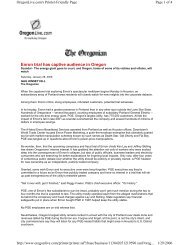- Page 1 and 2:
ENRON CORP., et al.Reorganized Debt
- Page 3 and 4:
DEUTSCHE BANK TRUST COMPANYDELAWARE
- Page 5 and 6:
TABLE OF CONTENTSPageI. NATURE OF T
- Page 7 and 8:
d. The Insiders engaged in a scheme
- Page 9 and 10:
(d) Barclays’ improper appropriat
- Page 11 and 12:
(a) LJM1 and the Rhythms Hedging tr
- Page 13 and 14:
COUNT 17COUNT 18(Avoidance of the C
- Page 15 and 16:
F. COUNTS 42 - 44 (Against Merrill
- Page 17 and 18:
COUNT 67(Recovery of the Challenged
- Page 19 and 20:
Steele ............................
- Page 21 and 22:
REORGANIZED DEBTORS’ FOURTH AMEND
- Page 23 and 24:
3. A second large group of transact
- Page 25 and 26:
these partnerships secret from Enro
- Page 27 and 28:
approved the employment of Stephen
- Page 29 and 30:
managed by a new board of directors
- Page 31 and 32:
17. Plaintiff and the affiliated en
- Page 33 and 34:
headquarters at 270 Park Avenue, 35
- Page 35 and 36:
Germany. Deutsche Bank AG does busi
- Page 37 and 38:
55. Defendant Deutsche Bank, S.A. i
- Page 39 and 40:
67. Defendant Merrill Lynch Capital
- Page 41 and 42:
successor, agent, co-conspirator, c
- Page 43 and 44:
10. The RBC Defendants92. Defendant
- Page 45 and 46:
107. Not Used.108. Defendant Sphinx
- Page 47 and 48:
118. Defendant Enron Sterling Credi
- Page 49 and 50:
126A. Each of FleetBoston Financial
- Page 51 and 52:
eports. In these reports and their
- Page 53 and 54:
Fastow was fired in late 2001 and E
- Page 55 and 56:
c. Fastow and Kopper orchestrated (
- Page 57 and 58:
immediately. As part of his plea ag
- Page 59 and 60:
3. How The Scheme Workeda. Enron em
- Page 61 and 62:
could not trade with others in the
- Page 63 and 64:
• Funds flow from operations, def
- Page 65 and 66:
d. The Insiders engaged in a scheme
- Page 67 and 68:
178. Self-interested partnerships -
- Page 69 and 70:
specifically, when the relevant tra
- Page 71 and 72:
eported the repayment obligation as
- Page 73 and 74:
nature of these transactions and/or
- Page 75 and 76:
2governs the securitization of fina
- Page 77 and 78:
unless independent third parties ma
- Page 79 and 80:
211. An actual example: On December
- Page 81 and 82:
transactions. The Insiders took the
- Page 83 and 84:
LJM2. In doing so, the Insiders rec
- Page 85 and 86:
LJM2 (technically, LJM Co-Investmen
- Page 87 and 88:
235. From the beginning, Fastow kne
- Page 89 and 90:
244. The Southampton transaction ul
- Page 91 and 92:
249. By the end of December 1999, f
- Page 93 and 94:
threats of no future business or pr
- Page 95 and 96:
Fastow’s participation in the LJM
- Page 97 and 98:
262. Citigroup’s participation in
- Page 99 and 100:
Id. at B-1 (emphasis added).266. Wi
- Page 101 and 102:
period, Citigroup completed over 60
- Page 103 and 104:
one another and to cause one anothe
- Page 105 and 106:
Yosemite IV USD 5/24/01 $775.1 mill
- Page 107 and 108:
linked promissory notes to institut
- Page 109 and 110:
of which also involved Enron) and o
- Page 111 and 112:
and Andersen may have worked togeth
- Page 113 and 114:
monetizations became less attractiv
- Page 115 and 116:
(3) The minority interest transacti
- Page 117 and 118:
CITI-B00393281 (quoted in Exam. III
- Page 119 and 120:
issued Irrevocable Letter of Credit
- Page 121 and 122:
Citigroup’s own internal descript
- Page 123 and 124:
alance sheet. Through Sundance Indu
- Page 125 and 126:
[T]he Bacchus transaction was steep
- Page 127 and 128:
327. Before the Bacchus transaction
- Page 129 and 130:
tier 1 banks.” CITI-SPSI 0036296.
- Page 131 and 132:
prepays, two FAS 140s, and one tax
- Page 133 and 134:
(1) Chase’s relationship with Enr
- Page 135 and 136:
using a proprietary technology. It
- Page 137 and 138:
discussion on this about 6 weeks ag
- Page 139 and 140:
357. In its complaint against Chase
- Page 141 and 142:
it was “purchasing the Natural Ga
- Page 143 and 144:
his July 28, 2003 letter to Manhatt
- Page 145 and 146:
commodity to JP Morgan Chase) under
- Page 147 and 148:
378D. In late November 2001, JPMC d
- Page 149 and 150: Garden State Paper Company, (ii)
- Page 151 and 152: ankruptcy. By the late 1990s, Barcl
- Page 153 and 154: 398. The Insiders used Nikita to mo
- Page 155 and 156: agreement but an instrument that wo
- Page 157 and 158: 408J. On or about December 7, 2000,
- Page 159 and 160: For example, Colonnade had not been
- Page 161 and 162: 420. Upon information and belief, t
- Page 163 and 164: 429. On or about October 30, 2001,
- Page 165 and 166: (c)Three million Four Hundred Fifty
- Page 167 and 168: 447. Each of the various individual
- Page 169 and 170: that effectively provided Barclays
- Page 171 and 172: 464. The Nixon prepay allowed Enron
- Page 173 and 174: All three (Deutsche Bank AG, Banker
- Page 175 and 176: financial statements improperly rep
- Page 177 and 178: customer to report the transaction
- Page 179 and 180: Insiders intended to accomplish the
- Page 181 and 182: 497. As part of the transaction, BT
- Page 183 and 184: (3) BT/Deutsche Bank limited its En
- Page 185 and 186: disclosed, “Enron could not have
- Page 187 and 188: 511. CIBC knew that in every FAS 14
- Page 189 and 190: understanding of the Insiders’ go
- Page 191 and 192: 523. Again, however, before CIBC ag
- Page 193 and 194: able to manipulate and misstate Enr
- Page 195 and 196: achieve accounting objectives, incl
- Page 197 and 198: Complaint in SEC v. Merrill Lynch,
- Page 199: 539. From 1997 through 2001, Merril
- Page 203 and 204: 550. Merrill Lynch knew that the 19
- Page 205 and 206: Insiders’ schemes, including its
- Page 207 and 208: (2) LJM1 and LJM2.561. As discussed
- Page 209 and 210: 566. CSFB therefore knew the hedge
- Page 211 and 212: proceeds resulting from those share
- Page 213 and 214: (3) The Prepaid Oil Swaps.577. In D
- Page 215 and 216: (4) FAS 140 transactions.(a)Nile583
- Page 217 and 218: or some of the equity investment. C
- Page 219 and 220: equity investment was not at risk.
- Page 221 and 222: App. L. at 22-23 n.81). In his resp
- Page 223 and 224: CSFB colleague two days before givi
- Page 225 and 226: Dominion’s return on Enron-relate
- Page 227 and 228: IV, App. G at 7 & n.23. In addition
- Page 229 and 230: Payments went in a complete circle
- Page 231 and 232: Dominion prepays - as cash flow fro
- Page 233 and 234: 619. Toronto Dominion also knew it
- Page 235 and 236: that, as a limited partner in LJM1,
- Page 237 and 238: etween 1997 and 2001, and, as of No
- Page 239 and 240: at 45. In addition to the direct an
- Page 241 and 242: these restrictions, a 39% discount
- Page 243 and 244: een held in LJM1, and RBS’s total
- Page 245 and 246: substantially assisted the Insiders
- Page 247 and 248: RBS compromised by letting the Insi
- Page 249 and 250: easons.” RBS 3141116 (quoted in E
- Page 251 and 252:
manipulation” in Enron’s financ
- Page 253 and 254:
saw their experiences with Enron-re
- Page 255 and 256:
Exam. at 102-03. RBC knew the Insid
- Page 257 and 258:
thing. However, we cannot in the do
- Page 259 and 260:
earn higher fees, then selling the
- Page 261 and 262:
investment that was not at risk and
- Page 263 and 264:
transactions in which Merrill Lynch
- Page 265 and 266:
TransferorObligorInitialTransferee
- Page 267 and 268:
716. On or within one year before t
- Page 269 and 270:
717. The transfers identified in th
- Page 271 and 272:
TransferorObligorInitial Transferee
- Page 273 and 274:
TransferorEnron orENAEnronEnronEnro
- Page 275 and 276:
TransferorEnron orENAEnron orENAEnr
- Page 277 and 278:
742. By reason of the foregoing fac
- Page 279 and 280:
745. The transfers identified in th
- Page 281 and 282:
TransferorEnron or ENAor ENGMEnron
- Page 283 and 284:
TransferorEnron or ENAor ENGMEnron
- Page 285 and 286:
765. Upon information and belief, w
- Page 287 and 288:
TransferorEnron or ENAor ENGMEnron
- Page 289 and 290:
TransferorEnron or ENAor ENGMEnron
- Page 291 and 292:
TransferorEnron or ENAor ENGMEnron
- Page 293 and 294:
770. The transfers identified in th
- Page 295 and 296:
TransferorEnron or ENAor ENGMEnron
- Page 297 and 298:
789. Each of the Chase Preferential
- Page 299 and 300:
TransferorEnron or ENAor ENGMEnron
- Page 301 and 302:
TransferorEnron or ENAor ENGMEnron
- Page 303 and 304:
796. Although certain of the Chase
- Page 305 and 306:
TransferorEnron or ENAor ENGMEnron
- Page 307 and 308:
TransferorEnron or ENAor ENGMEnron
- Page 309 and 310:
TransferorEnron or ENAor ENGMEnron
- Page 311 and 312:
TransferorEnron or ENAor ENGMEnron
- Page 313 and 314:
TransferorEnron or ENAor ENGMEnron
- Page 315 and 316:
TransferorEnron or ENAor ENGMEnron
- Page 317 and 318:
transfers; were engaged in business
- Page 319 and 320:
823. The payments characterized as
- Page 321 and 322:
TransferorEnron or ENAor ENGMEnron
- Page 323 and 324:
TransferorEnron or ENAor ENGMEnron
- Page 325 and 326:
TransferorEnron or ENAor ENGMEnron
- Page 327 and 328:
TransferorEnron or ENAor ENGMEnron
- Page 329 and 330:
TransferorEnron or ENAor ENGMEnron
- Page 331 and 332:
TransferorEnron or ENAor ENGMEnron
- Page 333 and 334:
840. The Chase 548 Purported Margin
- Page 335 and 336:
TransferorEnron or ENAor ENGMEnron
- Page 337 and 338:
TransferorEnron or ENAor ENGMEnron
- Page 339 and 340:
TransferorEnron or ENAor ENGMEnron
- Page 341 and 342:
TransferorEnron or ENAor ENGMEnron
- Page 343 and 344:
TransferorEnron or ENAor ENGMEnron
- Page 345 and 346:
TransferorEnron or ENAor ENGMEnron
- Page 347 and 348:
transactions (“Prepay Obligations
- Page 349 and 350:
COUNT 15(Avoidance of the Chase Pre
- Page 351 and 352:
871. Enron and/or ENA received less
- Page 353 and 354:
Code, those transfers are pled alte
- Page 355 and 356:
TransferorEnron orENAEnron orENAEnr
- Page 357 and 358:
902. The Barclays Preferential Tran
- Page 359 and 360:
of the security interest that is th
- Page 361 and 362:
TransferorEnron orENAEnron orENAEnr
- Page 363 and 364:
921. To the extent that any of the
- Page 365 and 366:
Barclays Bank on or about November
- Page 367 and 368:
COUNT 25(Avoidance of Unauthorized
- Page 369 and 370:
940L. By the Barclays Improper Appr
- Page 371 and 372:
949. Pursuant to section 553(b) of
- Page 373 and 374:
953. By reason of the foregoing fac
- Page 375 and 376:
the parties could, under certain co
- Page 377 and 378:
976. By reason of the foregoing fac
- Page 379 and 380:
y reference.COUNT 33(Avoidance of t
- Page 381 and 382:
996. Each of the BT/Deutsche Bank 5
- Page 383 and 384:
Transferor Obligor TransfereeEnron
- Page 385 and 386:
Transferor Obligor TransfereeEnron
- Page 387 and 388:
COUNT 36(Disallowance of Claims Und
- Page 389 and 390:
TransferorEnron orENA or ACFIObligo
- Page 391 and 392:
TransferorObligorInitialTransfereeo
- Page 393 and 394:
COUNT 40(Recovery of the CIBC 544 T
- Page 395 and 396:
elieved that they would incur, debt
- Page 397 and 398:
1068. The CSFB Preferential Transfe
- Page 399 and 400:
1082. Each of the CSFB 548 Transfer
- Page 401 and 402:
1095. Each of the CSFB 544 Transfer
- Page 403 and 404:
and (b) that CSFB, Pyramid I and/or
- Page 405 and 406:
H. COUNTS 50 - 54(Against Toronto D
- Page 407 and 408:
Transferor ObligorInitialTransferee
- Page 409 and 410:
COUNT 52(Avoidance of the Toronto D
- Page 411 and 412:
TransferorEnron or ENAEnron or ENAE
- Page 413 and 414:
1135. Upon and information and beli
- Page 415 and 416:
TransferorObligorInitialTransferee
- Page 417 and 418:
1167. The transfers identified in t
- Page 419 and 420:
J. COUNTS 60 - 64(Against RBC Defen
- Page 421 and 422:
COUNT 64(Disallowance of Claims Und
- Page 423 and 424:
1227. The Challenged Transaction Ob
- Page 425 and 426:
1232. The Challenged Transaction Ob
- Page 427 and 428:
COUNT 68(Disallowance of Claims Und
- Page 429 and 430:
1242. The Intentional Fraudulent Tr
- Page 431 and 432:
1250. The Intentional Fraudulent Co
- Page 433 and 434:
Plaintiff’s creditors and conferr
- Page 435 and 436:
1265. Plaintiff cannot at this time
- Page 437 and 438:
Transferor Defendant continued to h
- Page 439 and 440:
communications with investors the I
- Page 441 and 442:
1273. As a direct and proximate res
- Page 443 and 444:
information about the company’s c
- Page 445 and 446:
1287. Insider Causey did not disclo
- Page 447 and 448:
1299. Insider Fastow did not disclo
- Page 449 and 450:
1310. Insiders Fastow and McMahon d
- Page 451 and 452:
June 20011322. The Insiders did not
- Page 453 and 454:
Committee meeting on December 13, 1
- Page 455 and 456:
1345. Insider Causey did not disclo
- Page 457 and 458:
Chase IX Prepay1356. The Insiders d
- Page 459 and 460:
Chase XI Prepay1367. The Insiders d
- Page 461 and 462:
meetings in and around the time of
- Page 463 and 464:
transaction (including a meeting on
- Page 465 and 466:
1401. Insider Causey did not disclo
- Page 467 and 468:
1411. Insider Causey did not disclo
- Page 469 and 470:
despite the fact that the transacti
- Page 471 and 472:
1431. Insider Fastow did not disclo
- Page 473 and 474:
1442. Insider Causey did not disclo
- Page 475 and 476:
1453. Insider Fastow did not disclo
- Page 477 and 478:
the time of the transaction (includ
- Page 479 and 480:
1478. The Insiders did not disclose
- Page 481 and 482:
time of the transaction (including
- Page 483 and 484:
Committee meeting, at the August 1,
- Page 485 and 486:
1520. Insider McMahon did not discl
- Page 487 and 488:
1999, or the verbal insurances they
- Page 489 and 490:
(3) employing transactions with the
- Page 491 and 492:
(b)On or about September 17, 1999,
- Page 493 and 494:
(a)On or about November 24, 2000, S
- Page 495 and 496:
JP Morgan Chase1546. In connection
- Page 497 and 498:
1549. In connection with the Chase
- Page 499 and 500:
(a)On or about September 13, 2001,
- Page 501 and 502:
(a)On or about September 20, 2001,
- Page 503 and 504:
(e)In order to fraudulently meet Ar
- Page 505 and 506:
(b)On or about March 27, 1997, Thom
- Page 507 and 508:
(c)On or about December 29, 1998, R
- Page 509 and 510:
(a)On or about December 15, 1998, S
- Page 511 and 512:
1578. In connection with the Specte
- Page 513 and 514:
(o)On or about March 2, 2001, Rober
- Page 515 and 516:
(c)On or about December 8, 2000, Ja
- Page 517 and 518:
(a)On or about December 12, 1998, V
- Page 519 and 520:
(c)On or about December 13, 1999, D
- Page 521 and 522:
(f)On or about November 12, 1999, D
- Page 523 and 524:
(i)On or about March 1, 2001, Goss
- Page 525 and 526:
1596. Enron’s injuries as describ
- Page 527 and 528:
that were financially involved with
- Page 529 and 530:
(b) that CSFB, Pyramid I and/or Sph
- Page 531:
ENRON CORP., et al.,Reorganized Deb



